suzemo
I love mustelid haberdashery, vinho verde wine, and wensleydale with fruit.
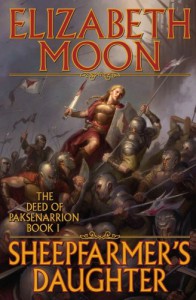
It's a very "old skool" military fantasy, with the exception that the bad-ass warrior hero happens to be a heroine. The narration starts sometime in the future and tells the story of Paksennarion, a headstrong girl who joined a mercenary outfit to escape an arranged marriage. Along the way we get a lot of training, details of camp and marching life, pretty good descriptions of war and pillaging, and discover that Paks has some sort of magical talent or ability. We're not sure how the magic system works, because Paks herself isn't sure of what's going on, but as this is the first part of a three part story, we might learn more later.
The characterizations weren't really strong, but it's not a character driven novel, in my opinion. The world building is solid, the plot was good, although it did get a little bit dry/slower with the training (and other) narratives. To be honest, I thought it was interesting and did not make me feel like I was slogging through it.
I can see why many people didn't love this book, but I really liked it, and will probably get around to reading/listening to the rest of the books in this... book.

I'm really not sure where the author was going with this book.
Sometime in the future, in a post-apocalyptic dystopian world, thanks to government/societal mandate, children grow up, hit a birthday and are shipped off to have mandatory radical plastic surgery so that everyone can be a "pretty." Apparently, looking different (or not pretty, according to whatever parameters have been set by the future rulers of society) is what has caused all of the problems in the world.
We have Tally (our protag?) and Shay, who are both "Uglies" (those that are too young and have not been surgically "enhanced" yet) as the two main characters. Tally is yearning for Pretty life, because her best friend "Peris" aged out and was made Pretty and lives with the other Pretties. Shay meets Tally and becomes her new BFF and questions the conformity of it all.
Apparently, the progression goes Pretty ("New Pretty" actually), Middle-Pretty (middle age) and Old Pretty ("Crumblies). Uglies are young and in school, they play pranks and general act out and are kids. New Pretties are mindless celeb types who just party all of the time and don't seem to have any sort of responsibilities. Middle Pretties seem to be the work force, they've now been enchaned so they show their ages but are still "Pretty", they have the jobs and the kids (Littlies, who seem to live with their parents until about 12). Crumblies are the geriatrics, and I'm not exactly sure what they're up to - the book doesn't go into them as much.
So anyway, The story covers mostly Shay and Tally, two uglies who escape and find an outside-the-city encampment of those who have rejected the conforming way of life and are trying to encourage and gather others that are not so keen on the government rule. They use and try to recreate old technologies (from the "Rusties", who are presumably based on our society, which has fallen) to supplement their way of life, so we hear a bit about that as well (and the environmental destruction that caused the fall of civilization as we know it). The bad-gov't guys are trying to find people and keep them in line. Along the way, we have a love triangle, so Shay and Tally can cat fight about a guy, because that's what girls do.
There are plenty of themes through the book, but none of them are very strong. Westerfeld seems to be going along with a "government dictatorships/conformity/beauty standards" are bad, but doesn't really go there all that strongly. More like he is using that idea to help fuel the story, which is otherwise fairly weak, imo. The characterization isn't strong, but I wouldn't expect it to be for a book that seems to be about messages, but the messages and plot aren't that strong either.
I'm not sure where the series is going, but I'm pretty sure I won't be reading any more of the trilogy.
It was merely Ok for me.

Mostly satisfying conclusion to a solid trilogy(ish). I say trilogy-ish because this book did leave things delightfully open ended, so you can create your own stories about it, or just wait for Laini Taylor to write more books in this universe (which I would not be surprised by, she already has some novelettes based on secondary characters).
I feel like the book felt really rushed/forced because there was just entirely too much going on. There were new characters introduced (and/or dropped... if I didn't just forget them), and an entire race that became really important, all of a sudden and felt more than a little forced.
After a largely solid 2 books worth of world building, I felt a little bit frantic - not everything was explained, or explained well (at any rate) and not everything was fleshed out. This largely contributed to some insane pacing issues. The book started (chronologically before the end of Days of Blood..) at a pretty good pace, and then picks up quite quickly, with a lot of action happening fairly quickly.
The language and the visualizations that the author used are still very nice, like the first two books, and I still really loved many of the secondary characters, but this book just felt a little rushed, maybe a little under developed. I'm sure many others will adore it, and if I were younger, I might be more forgiving, but I just found it OK. I didn't feel like I wasted my time or money on this book, but I do not think it was as good as it could have been with more polishing, or being spread out into another book if the story was the one the author really wanted to tell.
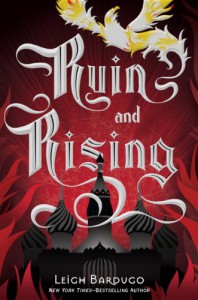
The last book in the Grisha trilogy, and I thoroughly enjoyed the trilogy - it's all fantasy with some fun YAness and tons of Russian influence. And we all know I love Russian influence.
This book is probably the strongest in the series. The characters are (mostly) very well written, multi-layered, complex, and pretty realistic (all considering). I loved the secondary characters, they were fun and interesting as well, and I felt invested in just about all of the characters in the story. Even the Marty Stu was interesting. My only real complaint with any characterizations is that I thought that Alina started off very strong, but then ended up very weak.
The world building wasn't any more complex than the previous novels, but by now, the landscape and foundations of society were fairly complete and we're looking at the end of the trilogy, the end of the story, and there was a lot of intense action going on. I just wanted to spend all of my time listening to the audiobook (I'm sure if I had a physical book I would have been all over that instead).
There was a lot to like about this book. It was a very good book, for the most part.
I know that this series has a legion of rabid fans, and I'm not big into "shipping" and worrying about who the main character would end up with (since we had a love square running), so when I say that I knocked a star off because of the ending, it's not that I cared who Alina ended up with. Honestly, I felt like the author cheated the ending, making it more conventional and "happier", which didn't feel as satisfying as leaving it a bit messy. It made the ending very typical (and predictable), which is disappointing.

This (I believe?) is the last book of Mary Roach's I had left to read. It's one of her earlier ones, and to be honest, probably the one I enjoyed the least.
Whether it was due to the subject matter (I am not interested in, nor could I force interest in, the idea of an afterlife or soul), or the writing itself, I can't be sure.
It's very similar to the rest of her books, with humorous and wacky lessons all (sometimes loosely) connected to the main theme. It still has the dry wit and the "friend telling you hilarious stories over dinner" style that I find enjoyable in her books, but overall, it was pretty "meh" for me.
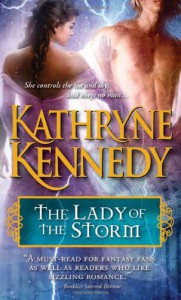
This is the second of the Elven lords (or whatever) romance series by Kathryne Kennedy. And it's not quite as good as the first book (Fire Lord's Lover), but still pretty solid.
There are cameos by characters from the first book. The world building is still pretty solid and interesting. England is ruled by 7 different elven lords from a different dimension, so it's a bit of alternate history as well.
My biggest issue is with the characters. They're not horrible, they just aren't very interesting. So yay for giving us an awesome heroine that doesn't need rescuing every 5 minutes, and yay for a romance novel for passing the Bechdel test... but it was just three stars for me.
I don't feel like I wasted my time, I just felt a little ploddy while reading for a bit.
Bonus cookies to myself for reading this during a hurricane.
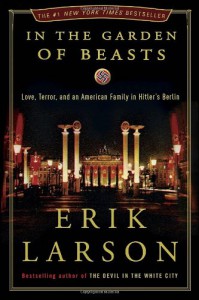
This is the second of Larson's books that I've read, and I have to say that I liked this one a lot more. I suspect it's because he wasn't trying to parallel two stories (one of them a gorefest).
This story is primarily about Ambassador William Dodd, an unlikely man for a foreign post, and his family, living in pre-WWII-Nazi Germany. Dodd is a history professor who takes the post after the Roosevelt administration has a hard time finding someone to take the post. He's an interesting man, more class conscious than I would have expected, and he is definitely an odd type of person to work for the foreign service - frugal and penny pinching, from "lower" class roots than his counterparts, who lavishly entertain foreign guests on their own dime and show off their prestige.
With him is his family - his wife and two children - though the most important is clearly his daughter Martha, a soon-to-be-divorcee who is sexually free and interested in the men and world around her.
It's an interesting book, if a bit slow. I already knew the framing of the story - how it is someone like Hitler and his party came to power, and why the US and its citizens acted as they did. What this story really brought was some of the personal bits and atmosphere into that time and space. How Ambassador Dodd reacted and worked in Germany, the antics that his daughter engaged in, and how all of the other dignitaries , foreign servicmen, and politicians reacted.
I thought it was interesting. Not the best book I've ever heard, but I enjoyed it and went out of my way to make sure I had time to listen to it.

So, I'm not going to go into a whole lot of detail or an overly long post. This is book #15 in the Dresden Files, and if you don't know where you are with this series by now, well, my little blurb isn't going to help.
Either you love it or like it, or are being forced to read it through forces I won't understand.
I still love the longer story arcs that this series is playing with, I still (mostly) love the growth that Dresden has, and I like that his story is doing different things rather than just making him bigger, faster, stronger every book (until he finally just becomes the universe, because seriously, how far can you go?).
I will say, that I did like this book a whole lot better than Cold Days and Ghost Stories. I thought this book, with it's fun twisty turnings, the changes and developments with the secondary characters, the return! of Michael! and Charity! was great.
All in all? I liked it a lot, and thoroughly enjoyed it, and definitely enjoyed it way more than the two previous, so yay for rewarding my faith, Butcher.

So I received this book as a gift, was told I really should read it, and threw it in Mt. TBR. Then the Hugo list went out, and I was reading about the books (I either have read them or have absolutely no interest in wasting my time), except for this one. Which I hadn't read, and was going to purchase, when I was roundly reminded that it had already been purchased for me. Oops.
And I read it. And sweet baby octopus, I adore it.
I had a bit of a rough start getting into this book. I read on the bus, in 20 minute gulps, and I firmly believe this is not the book to be doing that with. I actually had to skim the first few paragraphs to get a handle on what the hell I was reading. It's just not a "few minutes at a time" kind of book.
This book is phenomenally well written. The world building, I believe, is some of the best I've seen in SFF/spec fic in a long time. The plot was solid, the switching between back history and current events was smooth and easy to follow. It's sci-fi with an interesting militaristic bent without being a hard military-sci fi. It's space-opera without the cheese. There are humans and "humans" and things that are most definitely not humans-dressed-as-aliens. They're truly alien in their physiology as well as philosophy.
And I really liked and connected with the main characters in the story.
This novel is about a future/different/whatever space-faring expansionist society and what happens with a rather interesting breakdown in the despotic leadership. What happens when a machine, who is or is not human, is forced to go against their feelings but with their programs. What *is* human, what side are you on when your leader is on different sides. It's delightfully complicated.
This novel has already won several awards, and I really believe (and hope), wholeheartedly, it should win the Hugo. And I'm not lying when I say that when I read that this is the first of a series (whether it's linear or just in the universe), I actually squealed with happiness. I may have lost Iain Banks, but now I've got Ann Leckie.

- I want to be positive, because this book was close to having four stars...
So let's start off with the good things:
Decent world building. It's the last in the trilogy, so you expect an author to work within the world she's already built, but she actually expands it (which is both good, and very bad) - Origin myth - yayz for actually explaining where everything started, even though I felt like it was cheating a bit with the big info-dump
- No triangle. None. Strive and angst, but no love triangle. Thank you.
- The characters - Most of them were pretty good, and I did enjoy all of them, even the cartoony evil ones. But the secondary characters? Awesome.
And the bad:
- Dropped characters - People just... fell out of the story (well, a lot of storylines did), and while I don't always expect every ending to be tied up pretty, I do expect something beyond just being dropped. I realize I should grow a pair and get over that, it just didn't gel well with the story frame.
- Terribly anticlimactic. Not even a little bit. I listed on audiobook, and I thought "that's it?" and checked the time left (3hours, btw), and then listened to 3 hours of virtually nothing.
- Pacing, I'm probably double dipping here by mentioning the anti-climactic-ness (is that a word?) of it all, but the pacing was a bit uneven through the entire book. I think that also had a lot to do with the expansion of the world building and then a rushed effort to tie it all up (which felt very cheap).
All in all, it was a solid series. I'm not entirely sure how much this book ranks with the second one in the series, but I still liked the first one best.
Characters did grow, things did happen, it just wasn't quite up to my expectations (which are admittedly not very strict, so I don't know what I was expecting, just not lots of downtime and info-dumping). This book left so much open, and I'm not sure if that means that there will be more books (not necessarily within this storyline, but in the "world") or not, but the story is done, feels done (if not quite satisfying), and I'm done with it.
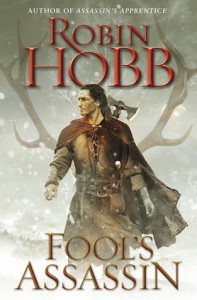
First I have to thank Random House/Del Rey Spectra/NetGalley for the chance to read this ARC.
And now to the review:
It's really best if you have read Hobb's Farseer and Tawny Man trilogies, because characters developed in those trilogies are once again main characters in this book (maybe trilogy?). It's not completely necessary, she gives enough information (without being infodumps), I think, for a naive reader to get along, and definitely a good amount (but not too much!) for someone who hasn't read the series in a long time to get their memories refreshed.
The primary protag is once again FitzChivalry Farseer. This book picks up after the others and he has settled down at Withywoods with Molly. I don't want to give away too much plot, but their lives progress quietly, until it doesn't.
We still get to see Chade and Riddle and a few other of the characters that have been well fleshed out previously. I think, much as the other trilogies she has written, that the Fool is still the principal character, even if he's not around all of the time.
It's a solid novel, and a good lead in to the (presumed) trilogy. I only have two real complaints, one is that Hobb is again being overly wordy, as I believe she's gotten in her later books. It's a (metaphorical in this case, since it's an epub) doorstop. The book is slow, and long, and it could be a nice lead in, but could have been much shorter. I felt every inch of that book. And I, personally, prefer series in which each book is a stand alone story. Not that there isn't an over-arching plot, but where one isn't left hanging.
But the landscape and atmosphere was good, and the characterizations were excellent, as always. So I would still highly recommend it to any fan of her other series.

The third (and final, of course) installment in the Milkweed Trilogy by Tregellis.
In the previous book, our rather sad characters were stuck in their very depressing, very cold-war alternate-timeline future, and we discovered what the name the Eidolons gave Marsh meant, so he goes back in time to 1940 to work with his arch-nemesis Gretel to prevent the end of the world (as we know it, as it were).
I have to say, I'm rather surprised that this trilogy isn't more popular because the entire trilogy is very fast paced and tightly written. There are no points where we get bogged down in middle-book-itis or flounder around to create enough material for three books (since that's currently the "thing" for YA).
The characters are appropriately changed, the older Marsh is not the same as the younger (which he shouldn't be), the attempts to nudge things the "right" way without being entirely sure it would work are nice (even better when they don't turn out as planned). The emotional issues that would come from going back in time and seeing everything as it used to be, as you wish it still were.
It was good. Lots of awesome characterization, but still lots of actiony plot, and a nicely wrapped up ending that makes you feel pretty good about the whole thing, while not necessarily being a "happily ever after" for everyone.

This is the second book in Tregillis's YA-Alternative timeline Milkweed trilogy.
Instead of picking up right after the events of the first book, we pick up about 20 years later. Everything has gone to hell -
In this timeline, the USSR pretty much has all of continental Europe under control and is waging a bitter cold-war with England. The US is busy being super-isolationist (and had never entered the war). The Soviets captured Gretel and Klaus at the end of the war with Germany, and are now running their own super-power/Xmen division.
In England, Marsh's life has fallen apart (with a disastrous marriage to boot), Will is being an utter ass (I seriously hate his sanctimonious hypocrisy). Everyone (who's still alive) gets back together for a fantastic reunion of Soviet busting fun when Klaus and Gretel make it back to England to defect.
Klaus, I think, is the only one I really care for, or at least, to me, is the only sympathetic character in the book. We find out that Gretel isn't just a sociopath, but a sociopath with an end game, and everyone else just seems to be limping through their lives, trying to hold what little they still have together.
But still, everything is super gritty, war (and life) is hell, and at no point do you feel happy during this book.
I love that even though it's a middle book in the trilogy, it doesn't suffer from middle-book-itis at all. It's fast paced, just as solid as the first work (if not more), and is very tightly and smartly written.
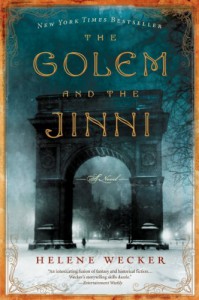
This book is probably one of the most difficult I've ever tried to write a review for.
It's not a difficult book to read, but it has a lot going on (now with a lot of characters), and it's like an onion with it's many layers (go, go common metaphor!)
At the most basic level - it's about its two principal characters - the Golem and the Jinni. It's about their history, their travels, their personalities and difficulties; their origin stories and how they make their way in the world is all there.
I love that the two main characters are mythological beings from non-mainstream/western cultures (basically, not the popular Greco-Roman gods, nothing Norse or European). The author uses good material that other authors usually ignore.
And at that basic level, it's a good, solid story. There's plenty of plot (though it's not fast paced and actiony), but a lot of good, solid character building in there. The book is both fun and melancholic, and does a fantastic job of making me connect with the characters and caring for them.
At the same time, there are a lot of deeper philosophical issues being explored through the book, through their lives and choices (or lack thereof) and through conversations and debate.
It's a fascinating work - both a good, solid fantasy read, and actual literature. Probably one of the best works I've ever read. It's not perfect, but it is fantastic.

This is a pretty solid anatomy guide for anyone that practices yoga and wants to understand the poses - what the muscles are doing, what the joints are doing, how your body is affected by stretching/pulling/breathing.
The illustrations are great, highlighting the primary muscles involved, showing how the weight should be distributed and what's anatomically going on.
I do love the explanations for each asana, how different movements change the focus and stresses on the system, and I really like that the book starts out with basic anatomy lessons. Even though I have a background in biomedical sciences, it's a good refresher, and also helps clarify what the author is trying to say when describing each pose.
The book is also well laid out, having sections categorizing the different asanas (sitting, inversions, back bending, etc.)

4 stars for the worldbuilding - it's fantastic
3 stars for the romance - it's OK.
Worldbuilding is something I hold in highest regard, and Meljean Brook has it down to a science in this series. It's an odd steampunky world, mixed with zombies, nano-tech, airships (and sea ships), pirates and politicos. There are still different countries and political systems in play (it's based on our past political systems, back in the day).
This book (the second in the series) actually has Lady Corsair as the main character/protag (well, at least as a duet with Archimedes Fox). She was the character in the first book I liked the most, so I was happy that she was featured in the next novel.
Archimedes Fox, adventurer (and main character in his sister's very popular books), has a secret past and a debt to pay, and is determined to fall in love with the mysterious and amazing Lady Corsair (that he met in the first book).
Lady Corsair has a debt to pay after some shenanigans involving her own ship, and she partners up with Archimedes to try to engage in some heists and some political intrigue.
Also romance and other stuff along the way. This is definitely a world and character driven romance, not erotica at all (with just a couple of kinda-steamy brief scenes).
While I want to be disappointed in the lack of smuttery, I adore the world building and have been completely hooked by this series.





